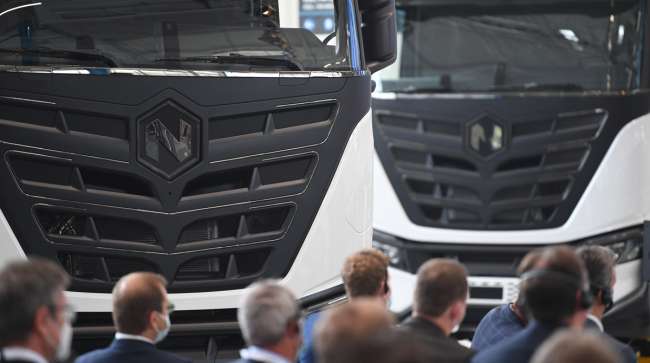Carriers spent considerable amounts of hard-earned cash on the Tre tractors, even as Nikola executives hunted for a financial backer for many months. (Andreas Gebert/Bloomberg)
If the manufacturer of the trucks you bought implodes, what do you do?
After Nikola Motors filed for Chapter 11 bankruptcy protection on Feb. 19, customers expressed hope a buyer could be found for the Phoenix-based Class 8 hydrogen fuel cell electric truck manufacturer.
Carriers spent considerable amounts of hard-earned cash on the Tre tractors, even as Nikola executives hunted for a financial backer for many months.
A couple of original equipment manufacturers were interested enough to carry out due diligence. Nikola CEO Steve Girsky, Chief Financial Officer Tom Okray and their colleagues were to be disappointed. So too were their customers.
Customers of corporations entering bankruptcy proceedings typically find themselves in one of two situations:
- Not much changes on a day-to-day basis as debts are reorganized.
- There’s an all-out scramble to source new suppliers and logistics solutions.
The day-to-day reality for carriers who own Nikola rolling stock was the latter. All need hydrogen supplies to keep the trucks on the road.
Some have secured the fuel the tractors need. Others parked the trucks as court proceedings play out.
All continue to work the phones in search of more amenable solutions.
When Transport Topics spoke in March to Jim Gillis, president of the Pacific Region at IMC Logistics, he was “figuring out Plan B, C & D for if Nikola doesn’t survive.”
“Now I’m working on Plans E, F & G,” he said in a phone interview in recent days. “It’s been a very painful couple of months.”
IMC has 50 Nikola hydrogen fuel cell tractors, which Gillis describes as the largest U.S. deployment of FCEV tractors. As of the last week of June, 40 were operational and 10 are out of action.

“Our commitment was to keep the trucks running. So, we took it on the chin with the increased fuel cost,” Gillis said. (Nikola Motors)
The fifth-largest drayage carrier in North America, IMC was able to secure a new hydrogen supplier.
But the fuel came at considerable extra cost. The hydrogen price increased from $7.50 to $29 per kilogram, said Gillis.
IMC’s current demand is 10,000 kilograms per week, but if the company’s Tre FCEV tractors were operating at their full range, it might require as much as 35,000 kilograms a week, he said.
“We’re trying to keep them a little bit closer to base because of the increased cost of hydrogen. Our commitment was to keep the trucks running. So, we took it on the chin with the increased fuel cost,” he said.
Gillis declined to provide the name of IMC’s new hydrogen supplier, although he did hint that it was an oil company. “They’ve done a remarkable job with producing as much hydrogen as we need. We’re a pretty heavy user,” he said. IMC is looking for a permanent solution in the Long Beach area, he said.
Maintenance is an even bigger issue. Maintenance is carried out for IMC by Tom’s Truck Center and GTS Group.
Still, there are no software updates or fixes.
Conversely, 4Gen Logistics, which operates 15 Nikola FCEVs, parked the trucks mostly because of concerns about what would happen should any break down, said Duncan Trucking Vice President of Strategic Initiatives Brad Bayne. Phoenix-based Duncan is the parent company of Rialto, Calif.-based 4Gen.
The jump in the price of hydrogen didn’t help either, Bayne said. 4Gen was sourcing its hydrogen from Nikola’s Hyla refueling unit. He said the new price would have been four times the price the company paid previously.

Without being able to source hydrogen from Nikola’s Hyla refueling unit, 4Gen would have to pay four times the price. (Mindy Long for Transport Topics)
4Gen also decided to park the Nikola trucks because its other zero-emission trucks could meet the carrier’s commitments, Bayne said. 4Gen has 64 battery-electric tractors — 41 Volvo VNRs, 20 Kenworth T680Es and three second-generation BYD 8TTs.
But he said: “We’ll have to figure out what we’re going to do if there’s no way of doing maintenance on the trucks going forward.”
Neither IMC nor 4Gen entered the parallel auctions of physical Nikola inventory or intellectual property. The former includes 103 brand-new hydrogen fuel cell Tre tractors.
Visits to Nikola’s Phoenix and Coolidge, Ariz., and Fontana, Calif., sites began at the start of June for buyers interested in the physical inventory.
Hilco Streambank is marketing the former truck maker’s “intangible assets,” otherwise known as its IP — the patents, proprietary truck management software, trade secrets, designs, research and development data, trademarks, customer data and license agreements.
Bayne said it would be interesting to see what comes out of the bankruptcy court proceedings. “We’re very hopeful that something positive will come out of this,” he said.
“My hope is that because it hasn’t become a Chapter 7 rather than Chapter 11 bankruptcy, there will be a solution found,” Bayne said.
In the meantime, the search for additional support for day-to-day operations continues, with both executives voicing optimism that port operators and state authorities would aid carriers.
There is statewide interest in developing hydrogen fueling infrastructure for the transportation sector, said Gillis, adding: “I’m confident the state doesn’t want to let that go.”






